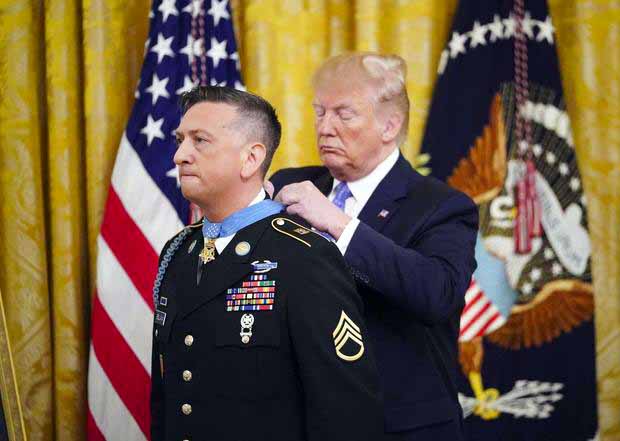President Donald Trump awarded the Medal of Honor, the nation’s highest military decoration, to Army Staff Sergeant David Bellavia, who put his life on the line in Fallujah to save his squad in the bloodiest battle of the Iraqi War in 2004.
Sgt. Bellavia was fighting in Operation Phantom Fury, in which more than 10,000 U.S. troops took back 3,000 to 4,000 deeply entrenched insurgents in what had once been a city of more than 350,000 people. The intense clash, commonly known as the Second Battle of Fallujah, included scores of close-quarters gun battles in house-to-house fighting.
On November 10, 2004, the Staff Sergeant’s 29th birthday, his platoon was tasked with clearing a block of a dozen buildings where several insurgents were suspected of hiding. In one of the compounds, insurgents armed with machine guns ambushed Bellavia’s squad as it was trying to clear the house. The soldiers were pinned down in the dark house under intense, close-range machine-gun fire.
The soldiers were wounded and trapped. It was at that moment that Bellavia took it upon himself to act. Risking his life, Bellavia stepped into the doorway and squeezed the trigger of his M249 light machine gun until the belt of ammunition was spent. The American soldiers, including Bellavia, retreated from the house successfully into the night, as insurgents fired on them. This was just the beginning of the soldier’s valor.
Bellavia, 43, of Lyndonville, New York, became the first living American to receive the Medal of Honor for actions in the nearly nine-year Iraqi War. President Trump draped the award around his neck during a White House ceremony as friends, family and 32 people who served with Bellavia in Iraq watched and then cheered.
“Alone in the dark, David killed four insurgents and seriously wounded a fifth, saving his soldiers and facing the enemies of civilization,” Trump said.
In the latter half of the battle, Bellavia re-entered the house after a U.S. Bradley Fighting Vehicle pounded it with 25 mm cannon fire, with other soldiers covering him. The building was filling with slick, noxious water after the plumbing was destroyed by gunfire, but insurgents inside were still alive. Bellavia pursued them because they had a rocket-propelled grenade launcher that could have killed numerous U.S. troops.
Bellavia fatally shot an insurgent preparing to load a rocket-propelled grenade. A second insurgent fired at him and Bellavia wounded him in the shoulder. When Staff Sergeant Bellavia entered a bedroom, the wounded insurgent followed, forcing Bellavia to kill him. When another insurgent began firing from upstairs, Bellavia returned fire and killed him. A fourth insurgent then jumped out of a closet in the bedroom, yelling and firing his weapon as he leaped over a bed trying to reach Bellavia. The insurgent tripped and Bellavia wounded him. Bellavia chased the enemy fighter when he ran upstairs. He followed the wounded insurgent’s bloody footprints to a room on the left and threw in a fragmentation grenade. Upon entering the room, Bellavia discovered it was filled with propane tanks and plastic explosives. He did not fire his weapon for fear of setting off an explosion and then engaged in hand-to-hand combat. Bellavia actually used his helmet to pound the enemy fighter until he could finish him off with the blade of his knife.
In a meeting with reporters, soldiers who fought alongside Bellavia credited him with saving their lives. “He put himself in the line of fire and laid down a base of fire, overwhelmed the enemy long enough for me to get myself and the members of my squad out,” said retired 1st Sgt. Colin Fitts, one of the soldiers pinned down in the house. “Were it not for David Bellavia, I wouldn’t be sitting here today.”
Bellavia, speaking at the Pentagon about close quarters combat, said, “It’s horrible, it’s ghastly, it’s ghoulish. But you see people doing things for each other that they would never, ever do in any other circumstance and it is a sight to see. These were men who saw the enemy, made contact with the enemy and gave their lives for this country.”
Col. Douglas Walter, Bellavia’s former company commander, recommended him for the Medal of Honor early in 2005. Bellavia said that President Trump notified him late last year that he had been approved for an upgrade.
After leaving the Army in 2005, he co-founded Vets for Freedom, an advocacy group for veterans who served in the wars in the Middle East. He has also hosted a talk-show in Buffalo and ran for Congress as a Republican. He is interested in helping the Army in some capacity to find the next generation of soldiers.
“David often tells young people, Americans don’t want to fight. But if someone picks a fight for us, we’ll win. We fight for love of our country,” the President said. “He demonstrated exceptional courage to protect his men and defend his nation,” continued President Trump.
Throughout the Iraqi War, Bellavia also took part in battles in Najaf, Mosul, Baqubah and Muqdadiyah. His previous awards and decorations include the Silver Star, Bronze Star, Army Commendation Medal and many more honors. Bellavia was born and raised in Buffalo, New York. After graduating from Houghton Academy in Houghton, New York, he attended Franklin Pierce College in Rindge, New Hampshire and the University at Buffalo.
In 2007, Bellavia published a memoir, House to House: An Epic Memoir of War.
Bellavia now lives in western New York with his wife, Deanna and their three children.




